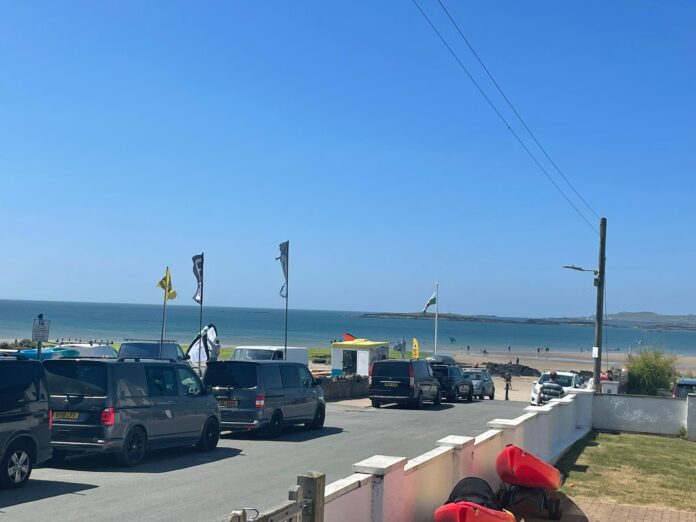Rhosneigr: A Historical Overview
Nestled along the rugged coastline of North Wales, Rhosneigr stands as a captivating village with a history as diverse and vibrant as its panoramic landscapes. Dating back to its early origins, Rhosneigr has been a witness to the ebb and flow of time, evolving from its humble beginnings into a cherished destination known for its unique character and enchanting charm.
With its first houses established by intrepid settlers, Rhosneigr’s history unfolds through tales of resilience, community, and progress. The village’s story is woven with threads of early roads that connected its growing populace, a railway station that brought accessibility, and the emergence of communal spaces that shaped its identity. As maritime influences coursed through its veins, the lifeboat station and tales of shipwrecks underscored the inseparable bond between Rhosneigr and the sea.
The village’s architectural landscape transformed with the construction of a pier, while the interplay of modernization saw the development of water and sewage systems. Personalities like Charlie Mills and Cefn Dref etched their narratives into the village’s tapestry, while artists, authors, and photographers captured its essence through various mediums.
From RAF Rhosneigr to places of worship like Horeb and Rhosneigr Chapel, the village resonates with historical significance. As lost buildings fade into memory, Rhosneigr remains a living testament to its enduring spirit, inviting us to uncover the layers of its captivating past.
The First Houses: Rhosneigr, a picturesque coastal village, has a rich history that dates back to its early days. The first houses were likely simple structures, built by early settlers who were drawn to the area’s natural beauty and resources.
The First Roads: As the village grew, the need for infrastructure became evident. The construction of the first roads played a pivotal role in connecting the community and facilitating trade and travel.
The Station: The establishment of a railway station brought newfound accessibility to Rhosneigr, enabling people to reach the village more conveniently and contributing to its development as a popular destination.
The Commons: Rhosneigr’s common areas have long been cherished spaces where residents and visitors could enjoy outdoor activities and gatherings. These open spaces have played a vital role in shaping the village’s sense of community.
The Lifeboat: The presence of a lifeboat station demonstrated Rhosneigr’s commitment to maritime safety, emphasizing the village’s connection to the sea and its dedication to saving lives in perilous waters.
Shipwrecks: The village’s proximity to the coastline meant that it was not immune to the dangers of shipwrecks. Over the years, Rhosneigr witnessed both tragic and heroic events as locals responded to maritime emergencies.
The Rhosneigr Pier: The construction of a pier marked a significant milestone in Rhosneigr’s history, providing a vital link for trade and transportation and fostering economic growth.
Water & Sewage: The development of water and sewage systems showcased the village’s commitment to modernization and improving the quality of life for its residents.
Charlie Mills & Cefn Dref: Charlie Mills and Cefn Dref are emblematic of Rhosneigr’s individual stories—personalities who left their mark on the village through their endeavors, contributing to its unique character.
Photographer Stephen Feather: Through the lens of photographer Stephen Feather, Rhosneigr’s landscapes, people, and events were immortalized, preserving moments that offer a glimpse into the past.
Artist Brian Entwistle: The artistic talents of Brian Entwistle added a creative dimension to Rhosneigr’s identity, capturing the village’s beauty and essence through art.
Author Jenny Cheshire: Author Jenny Cheshire’s literary works have intertwined with Rhosneigr’s narrative, allowing readers to delve into the village’s stories and history.
RAF Rhosneigr: The village’s association with the Royal Air Force left an indelible mark on its history, with RAF Rhosneigr serving as a reminder of the area’s military significance.
The Manning Fraud: The infamous Manning Fraud incident serves as a cautionary tale, revealing the darker side of Rhosneigr’s history and its connection to larger societal issues.
Horeb & Rhosneigr Chapel: Places of worship, such as Horeb and Rhosneigr Chapel, have provided spiritual solace and contributed to the community’s cohesion throughout its history.
Lost Buildings: Rhosneigr’s evolving landscape has seen the rise and fall of various buildings, each with its own story to tell. The memory of these lost structures continues to shape the village’s collective memory.
Rhosneigr War Memorial
The Rhosneigr War Memorial is a clock tower in the village of Rhosneigr on the Isle of Anglesey, Wales.
From its humble beginnings to its vibrant present, Rhosneigr’s history is a tapestry woven with stories of resilience, community, and progress. As generations come and go, the village remains a living testament to the enduring spirit of its people and the legacy they have created.






















